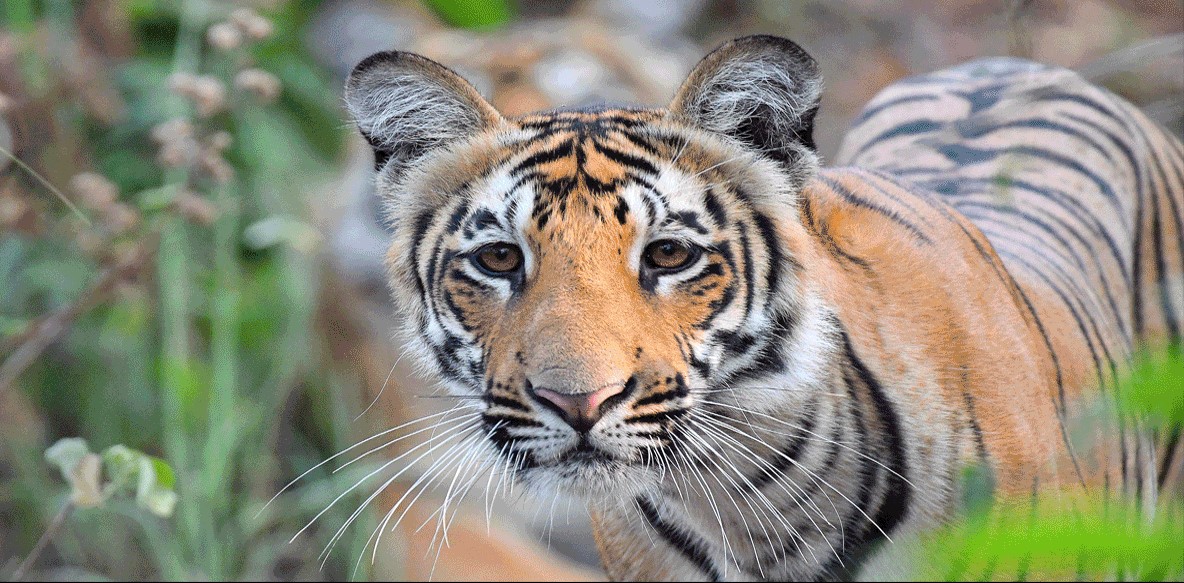
Park Information
PARK TIMINGS
The reserve is also rich in avifauna with almost 300 species of birds. Water birds include storks, teals, pintails, herons and egrets. Peafowl, jungle fowl, partridge and quail are the common ground birds. Birds of prey include eagles and kites. Scavengers include vultures. Owls, owlets and night jars are some of the nocturnal birds.
The reserve has 26 species of reptiles. Snakes of the reserve include the cobra, saw-scaled viper, wolf snake and Indian python. Lizards include the Indian monitor, gecko and chameleon.Kanha is also teeming with several species of insects and other invertebrates.
The floral diversity comprises over 600 species of flowering plants which include 50 species of aquatic plants and 18 species of rare plants.
The inventory of plants, reptiles and insects are not exhaustive, and there is still scope for intensive floral and faunal surveys.
Distances - Kanha National Park
Jabalpur-Mandla-Chiraidongri-Baihar-Mukki Gate: 189 km
Nagpur-Gondia-Balaghat-Baihar-Mukki Gate: 245 km
Nagpur-Seoni-Balaghat-Baihar-Mukki Gate: 287 km
Raipur-Simga-Kawardha-Chilpi-Motinala-Garhi-Mukki Gate: 185 km
Raipur-Narmada-Salewara-Malajkhand-Mukki Gate: 185 km
Bilaspur-Pandaria-Chilpi-Motinala-Garhi-Mukki Gate: 185 km
Gondia-Balaghat-Baihar-Mukki Gate: 125 km
Rajnandgaon-Khairagarh-Malajkhand-Mukki Gate: 170 km
Regulations and Permissions
- - Tourism in the National Park is regulated under the Section 34(1) of the MP Wildlife (Protection) Rules, 1974.
- - Visiting season is from 1 October to 30 June.
- - Excursions are allowed in the morning and evening (timings vary with season).
- - Carry sufficient drinking water.
- - Only petrol cars and jeeps are allowed inside the Park. Privately operated Gypsys and Jeeps are available for hire at Khatia and Mukki.
- - Keep sufficient fuel in the vehicle as supplies at the Kisli petrol pump are uncertain. Other petrol pumps near Kisli are : Mandla (70 km), Baihar (60 km) and Chilpi (80 km).
- - Plan excursions for early mornings and evenings as wild animals are most likely to be seen then.
- - Be at the entry points at least 30 minutes before the opening time to complete formalities.
- - Authorised guides are compulsory on each excursion. Trained guides are available for hire at the entry points.
- - Do take time to visit the Orientation Centre and get acquainted with the Reserve, its wildlife and the rules and ethics of eco tourism before setting out on excursions.
- - Do not litter.
- - For making documentary/tele film/cine film, please obtain prior permission from the Chief Wildlife Warden of Madhya Pradesh.
- - Entry and movement of visitors can be regulated by the Field Director for administrative or management purposes.
The following are strictly prohibited:
- - Walking on foot in the park- Driving off the roads or tracks
- - Playing transistors or blowing vehicle horns
- - Smoking or lighting fires
- - Littering
- - Night driving
Please remember, Kanha is a protected home for wildlife. Wild animals have the right of way in Kanha.
The Kanha National Park and Wildlife Sanctuary are governed by the Wildlife (Protection) Act, 1972, and their rules. Violators will be dealt with accordingly.
Tips - Echo Ethics
- - Obtain entry permit at the gate.
- - Official guides are a must on all excursions. Guides are available at the entrances.
- - Heavy vehicles are not allowed inside the park.
- - Keep strictly to the road during excursions. Do not get down from your vehicle.
- - Speed limit is 20 km per hour. Use of horn and headlights is not allowed.
- - Keep a good distance between vehicles.- Animals have the right of way.
- - Keep a safe distance from the animals. Respect their privacy.- Do not feed the animals.
- - Smoking is prohibited inside the park. Forests are vulnerable to fire, especially during the spring and summer months. Negligence, however trifling, may cause a widespread fire.
